The art of being Alan Cumming: The“ Traitors” host on bisexual pride and season 3 being Peacock hit's queerest

Entertainment Weekly's 2024 Pride cover star has no patience for stars who blame career woes on coming out — or for "assimilating to heteronormativity."
"Well, about time. What the hell?!" Alan Cumming says, letting out one of his signature guffaws.
The legendary actor and The Traitors host is all made up and looking muuuurderous. But he's not waiting for anyone — at least not in the traditional sense. Sitting down for a chat with Entertainment Weekly at a West Hollywood studio in early May, he's just learned he's the first openly bisexual person to pose for EW’s annual LGBTQ+ Pride cover.
Not that he's shocked. If the 59-year-old has been waiting for anything, it's for society to accept sexual orientation is not binary: "I think bisexuals, out of all the acronyms of LGBTQ+, are the ones that have had, not the hardest time, but it's never really changed," he says. "This sort of thing of, 'Oh, it doesn't really exist' or 'It's just a sort of stopgap before you go fully gay.' All that stuff is still prevalent. And so, even though I've been married to a man forever, I purposely define myself as bisexual because I have had relationships with women. I've been married to people of two genders."
Sign up for Entertainment Weekly's free daily newsletter to get breaking news, exclusive first looks, recaps, reviews, interviews with your favorite stars, and more.
The Tony winner (and Emmy, Golden Globe, and Screen Actors Guild Award nominee) was just 21 when he married for the first time. He met wife Hilary Lyon at the Royal Academy of Dramatic Art, and they entered their marriage both knowing Cumming is bisexual.
"I've always felt very bi-visible," he explains. "I've always known lots of people who are bisexual. I guess I'm in the arts, so there's quite a few. Because of the archaic tropes about bisexuality, a lot of people don’t talk about it, or choose to identify as another [letter] in the [LGBTQ+] acronym. But I have always sort of embraced that and felt that was where I sat most accurately."
After his eight-year marriage to Lyon ended in 1993, Cumming most notably dated actress Saffron Burrows (Boston Legal, Law & Order: Criminal Intent, You) for two years and had a six-year relationship with theater director Nick Philippou before the actor became civil partners with illustrator Grant Shaffer in 2007 and then legally husbands in 2012.
"I always say that sexuality is like going on a vacation: You don't always want to go to the same place twice," Cumming muses — though he could also be commenting on his career, which has been full of unexpected turns since he made his TV debut 40 years ago.
Catching up with EW a few weeks later, on the eve of Pride Month — first as he drives home through the Scottish countryside from his first day shooting The Traitors season 3 and then from his hotel where he's greeted by Shaffer and their collie-spaniel mix, Lala (or "Miss Lala," if you're feeling proper) — Cumming reflects on his four decades on screen, the ways his activism has impacted his career, how he pushed for more queer contestants on his hit Peacock reality competition series, and why he thinks the queer community should stop "assimilating to heteronormativity." (And, of course, that fabulous Traitors fashion.)
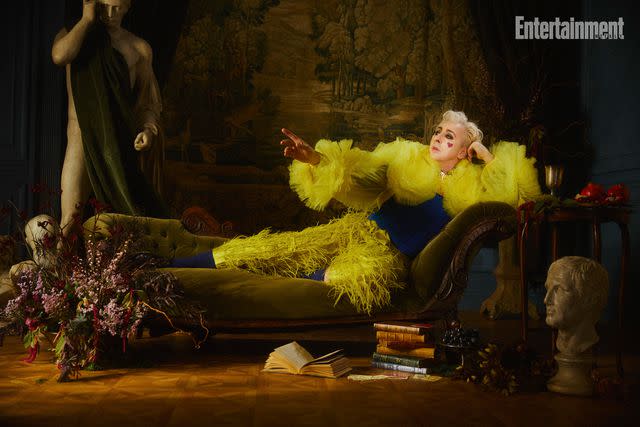
ENTERTAINMENT WEEKLY: How do you feel knowing you're the first openly bisexual person on our LGBTQ cover?
ALAN CUMMING: I just think it's really important to remind people that bisexuals are everywhere. And I think, when you're well-known and queer, you have a certain duty to look back and help the people who are coming along behind you. With all the terrible laws [being enacted against] trans people… I feel politically it's important to stand up and make sure that other people are being represented. I really credit the trans community and the trans explosion over the past decade or so — and non-binary people — for helping people understand the idea that things are not black or white, it's not one thing or another. It's ever-changing, ever-moving. And I think, in a way, that's really helped people understand bisexuality too. They've broken the binary.
You do that as well, with your genderf--- Traitors wardrobe.
I think I've always been sort of comfortable with androgyny, or playing up my femi-side [on carpets and] doing shoots. In real life, I don't really do that. I have my own sense of style, but it's a bit more "weird little elf" rather than Fashion God. But I actually really enjoy playing with the masculine and the feminine. And again, I think it's really important, as someone in the mainstream, to challenge people's views of what a man of my age should wear. I like that a show like The Traitors, a reality competition show, is able to have big statements about, as you say, genderf---ness.

Did you envision that from the very beginning when they asked you to host the show?
Well, I didn't quite understand why they wanted me to do it. But I met with them and I realized that it was because they wanted me to be theatrical and camp, to play this larger-than-life character, and create the mood of the whole show. Once I understood that, I was really on board. And then, of course, getting to work with costume designer Sam Spector. When I have a costume on, I really understand what to do.
Having the freedom to push the boundaries like we've been doing, that's made it really exciting. It's great to see that working — with viewers' interest in the show — so that when we come back to it each season, we kind of up the ante a bit more. It's a great thing to remember to say yes to life, and say yes to things that you don't really understand or seem a little weird. I think as you get older, you're encouraged not to do that — so, for me, it's been really important to flout that convention. And here I am doing this show that I really enjoy and have such a laugh doing. This whole experience of The Traitors has been so great, and partly because it was so left-field and unexpected for me.
The queer community has flocked to The Traitors, as they have to other competition shows like Survivor and Big Brother. Why do you think that is?
I think the reason people like The Traitors is because it's the campiest thing since Christmas. There's me swanning around in a faux fur with a feather in my hair. But also, it is camp in that it is very heightened. And it's also about people lying. Something about queerness is that you understand the concept of having to hide something about yourself, so that's very similar to the experience of The Traitors. I actually lobbied quite hard to have more queer representation, in terms of the contestants in this next season.
On a purely statistical basis, I think [the previous casts have been] very diverse racially and gender-wise, but there just wasn't enough LGBTQ people represented. It's exposure therapy, it's visibility. And you have to do it in every small way you can. We need to see that trans people are everywhere. They felt more comfortable to be visible in the last couple of decades. But historically, there's always a backlash against change, and we are in the midst of a huge one right now. My response to that is to push back and say, "No, we're not going to hide. Here are those people." And if I have a chance to help do that by just saying to the producers of The Traitors, "We need to make sure there's more queer and trans people on the show," I will.
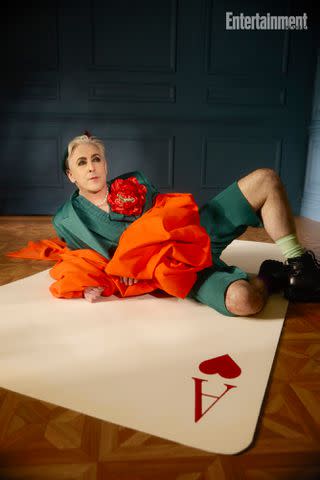
Do you feel there's a potential game impact when you walk in being the only queer person versus having other contestants who are also queer?
I don't know…. Last season, [RuPaul’s Drag Race alum] Peppermint [being banished] first, I think it was just by chance. But that was not a good look in the world we live in: that the first person to go out is a trans person of color, and one of the only queer [contestants] on the whole show. Obviously, it's shone a bigger spotlight on it. So I don't think that they had a disadvantage, but it would be better if there were more [queer] people there, so it didn't seem like they were token. We've just got to be more representative. And even if there are more…. I think, "Why can't we have more people on these shows than actually are, percentage-wise, in society?" Why would that be so bad? It's happened for centuries the other way around with white straight men. I mean, why are we being so shackled by our quotas? There should be trans and queer people everywhere, and people of color everywhere, until people just shut up and stop being so stupid and hateful about it.
What about in your own career? Did you see any negative impact when you came out publicly in 1998 after breaking big in Spice World and Romy and Michele's High School Reunion?
I think all that stuff is so hypothetical. It's difficult to talk about, because how can you tell? But I felt nothing but positivity about it. It wasn't a huge surprise, of course, to everybody who knew me and a lot of people in the industry, and in the press even. It was just formalizing. And I think that was an important thing to do. I could have just slid into not mentioning it, but I actually wanted to make a point of it because I think a lot of people choose to avoid the bisexual tag, just because they're wary of having to deal with all the questions and all the, "Well, are you gay now because you're with a man?" and stuff like that. But in regards to the work part, nothing changed, I don't think. I still play a whole variety of people.
Not everyone has felt as lucky.
When people in the past have said they wish they hadn't come out because it's changed their career, that makes me so angry because I think it's sometimes easy to blame something like that for your career not going the way that you hoped it would. Also sometimes, if you're not convincing as someone, then you shouldn't play them.
The biggest thing that we're all missing in this argument, and that's really important to me, is the benefit for your personal life, for your mental health, for your well-being, for your friends and family, for everything in your life apart from your work. There's such a huge benefit to just being authentic and being the person that you are, and not lying anymore. I think that's far more important than whether or not you got some action movie or whatever.

I was doing something with Bowen Yang and I said to him, "Oh gosh, it must be a bit lonely being this 'first-ever gay Asian person' in a lot of spaces, and a lot of responsibility," and all that stuff. And he said, "Well, what was it like for you in the late '90s? You were about the only queer person that I can remember." And I was like, "Oh gosh. I didn't think about it in that way, but I was." I didn't feel lonely, but I was one of very few. I'd go on talk shows and talk about marriage equality, or coming out, or all those things in a way that wasn't scary. I was just talking about my life and being authentic.
But really, the thing that makes me most happy in all my work is when people say they saw me talking on a talk show about being queer and I was happy and had no shame about it. Or they saw me on the Tonys dancing provocatively with another man, or something like that. All that, to me, is really important and inspiring…. Hang on. My husband's just arrived.
[Cumming and Shaffer greet each other]
Well, that’s a perfect segue. You have a seemingly happy marriage, as he walks in the door.
Yes. On cue. [Laughs]
Not planned at all…. Given your constant traveling and long hours for work, does your relationship provide a sense of groundedness?
Yes, and that's incredibly important to me. I mean, I've been coupled most of my adult life in one way or another. It's rare that I've been single, and I like it. I'm drawn to being a part of a duo. I like coupling, and I like having a partner. I think that's really important. I made some very bad choices along the way, but now we are celebrating 20 years in July, Grant and I, that we've been together. It's incredible. I can't believe it. Especially in gay years, that's like 80. [Laughs] But yes, I feel grounded, and rooted, and I also feel very supported. He's so supportive of me in everything I do.
And he has his own life. He's an artist, he's got his own thing that's very independent of me, and that's great as well. I really love that. I love the fact that we bring things to each other and it's a two-way street. And also, 20 years on, we are still in love and we still find each other really sexy. And most of all, we still make each other laugh.
In a way, I think one of the reasons why our relationship is so successful is that we have time apart. It allows you to miss that person. And when you go back, you celebrate them and you are joyful to be there. It's a positive made out of a negative, I suppose.
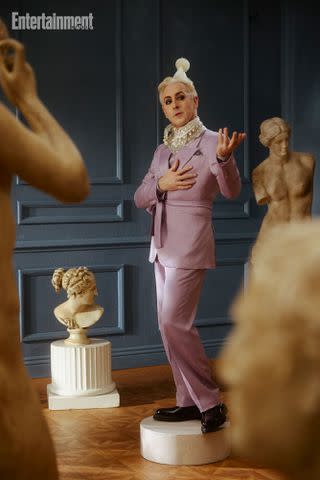
Speaking of negatives, there's a lot of them on social media. Do the trolls get to you?
No. I think as you get older you have a greater sense of perspective. Obviously, nobody likes being insulted or having death threats, but when it's happened many, many times…. It saddens me that it's so intractable. Last week, I put up a picture of myself and [transgender social media star] Dylan Mulvaney and Alok, the non-binary comedian, and there were lots and lots of positive comments, but also a lot of ignorant, insulting, misgendering stuff. Very anti-trans sort of rhetoric. And I thought, “Wow, really? On my Instagram? Do you follow me? You follow me, and you're being transphobic? Wow.”
Are you tempted to turn comments off, or just never read them?
When you're in the public eye, that way madness lies: to read them and to take any credence from them. But once in a while, it's good to just sort of dip your toe in and say, "Oh, I see that's still happening." It's a little touchstone to find out where we are and how much work we still have to do.
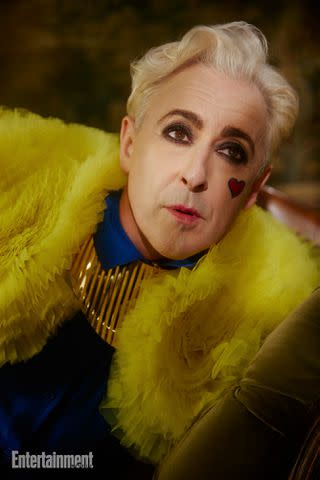
So what can we do?
Well look, here's the thing… [Laughs] I'm going to sound like Biden, "Here's the thing." But here's the thing. It's a terrifying time. There's so much happening in the world right now. There are hugely Draconian laws being passed. It's not just, "They don't like trans people, they're ignorant." It’s "They want us gone." In Uganda, the anti-gay bill is back on. In Brazil, there's horrible things happening. And it's a very scary time in America, obviously. If Trump gets in again, he's made it very clear what he will do.
One of the things that we are all fighting against in certain states is conversion therapy, this idea that queerness is something that can be changed and can be converted. But I feel what we should be talking about more is exposure therapy. When people are slowly exposed to the thing they’re scared of, they become more comfortable with it. We need to go to more places. We need to show our joy, and our happiness, and our differences.
One of the problems is, in trying to assimilate so much, we have not allowed people to see and embrace our differences. We've got to stop being so accommodating. We've tried assimilation to heteronormativity and it is not working. They still hate us. They still want us to be erased. We have got to be much louder, much angrier, use our power, fight back. When Target withdrew all those Pride items from their stores because some right-wing moms group complained, why did we not boycott Target? Why are we not using our economic spending power to send Target a message? We need to be better organized to fight back. We've got to stop being so meek and thinking we can win this by signing petitions. We've got to be more ballsy. Use our power, but also spread our joy and say, "We’re great. We are really great. We have magic, we have joy. We are happy with ourselves. What is wrong with you? Why are you so angry at our joy?"
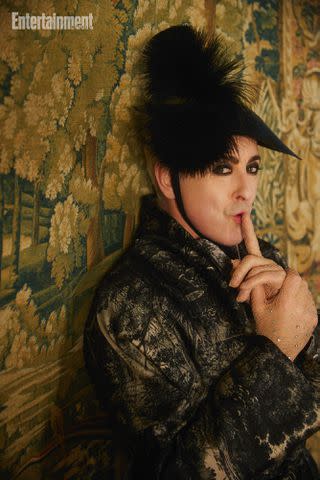
Well, let's end this with a little joy. You've done so many fantastically queer projects. Which one do you think has been your queerest?
Oh, I think the X-Men film I'm in [2003’s X2: X-Men United,] is the gayest film that I've ever done. It's got a queer director, lots of queer actors in it. I love the fact that something so mainstream and so in the comic book world is so queer. In a way, those sorts of films really help people understand queerness, because you can address it in an artistic way, and everyone is less scared of the concept. It's an allegory about queerness, about people having these great gifts and really great, powerful things that they have to hide to exist. Queer people understand what that's all about.
---------------------
Directed by Kat White
Photography by Lenne Chai
Motion - DP: Kat White; Steadicam Op: Loren Hamilton; 1st AC: Bethani Mosher; 2nd AC: Ellie Rabenberg; Gaffer: Andrea Lynn Sachs; BBE: Joey Rodriguez; Key Grip: Tim Shinkle; BBG: Ted Thornton, Producers: Kristen Harding, Alison Wild
Set - Production Designer: Kendra Bradanini/Murtha Skouras; Art Director: Sophie Weir; Set Decorator: Fiona Jett Robinson; Set Dresser: Jonathan "JROD" Rodriguez; Scenic Painter: Bridget James
Photo - Assistants: Tatiana Tate, Chir Yan Lim; Digital Tech: Dante Velasquez
Alan: Styling: Sam Spector; Styling Assistants: Brooke Llewellyn, Yuly Child Phillips; Tailor: Tia Usher; Grooming: Erman Ospina/Armani Beauty/Exclusive Artists
Post-Production - Color Correction: Nate Seymour/Trafik VFX: Jaime Aguirre/Trafik; Design: Chuck Kerr; Score: Morning Moon Music
Behind-the-Cover Video - DP: Ted Newsome; Cam Op: Michael Ballard; Sound: Jake Sedlar; Film Videographer: Kristen Harding; Interviewer: Patrick Gomez; Associate Producer: Morgan Sanguedolce; Editors: Maura Wiley, Edwin Clavijo, David Rice
EW Creative - Photo Director: Alison Wild; Head of Video: Kristen Harding; Creative Director: Chuck Kerr
Clothing Credits
COVER
Suit; Dzojchen; Cape: Chris Habana; Collar: Rinaldy A. Yunardi; Hat: Piers Atkinson
STATUE
Blazer, Shirt; Dzojchen; Hat: Adolfo
COUCH
Shirt: Vintage; Pants, Jacket: Dawid Tomaszewski; Shoes: Gucci; Hat, Jewelry: Vintage
CARDS/PORTRAIT
Tank: Versace; Suit: Atelier Cillian; Cape: Dawid Tomaszewski; Shoes: Hugo Boss; Hat; Vintage
ACE OF HEARTS
Suit: Dzojchen; Cape: Killian Kerner; Boots: Thursday
Read the original article on Entertainment Weekly.

 Yahoo News
Yahoo News 
